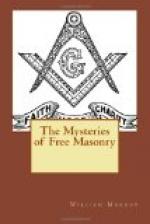across the path the candidate must travel, some inches
from the floor, make no comfortable traveling for
a person blindfolded. But this is not always the
way it is prepared; billets of wood singly, or in
heaps, ladders, nets of cord, etc., etc.,
are all put in requisition to form the rough and rugged
paths, which are intended as a trial of the fidelity
of the candidates. If they escape with nothing
more than bruised shins they do well. They have
been known to faint away under the severity of the
discipline, and occasion the worthy companions
much alarm. After traveling the rugged paths
till all are satisfied, they arrive at the first Veil
of the Tabernacle, give the pass-word, and pass on
to the second, give the pass-words, and present the
sign. This, it will be recollected, is in imitation
of the sign which Moses was directed to make to the
children of Israel. He threw his rod upon the
ground and it became a serpent; he put forth his hand
and took it by the tail, and it became a rod in his
hand. The conductor is provided with a rod, made
in the form of a snake, and painted to resemble one.
This he drops upon the floor, and takes it up again.
They then pass on to the next Veil, give the pass-word
and make the sign (put the right hand in the bosom
and pluck it out again); pass on to the next, give
the pass-words and make the sign (pour water upon
the ground), and are ushered into the presence of
the grand council. The Veils are four
in number, and of the same color as the banners of
the three Grand Masters of the Veils, and that of
the Royal Arch Captain, blue, purple, scarlet and
white, and have the same references and explanations.
[See Lecture.] The Grand Council consists of the Most
Excellent High Priest, King and Scribe. The High
Priest is dressed in a white robe, with a breastplate
of cut-glass, consisting of twelve pieces, to represent
the twelve tribes of Israel; an apron, and a mitre.
The King wears a scarlet robe, apron, and crown.
The mitre and crown are generally made of pasteboard:
sometimes they have them of the most splendid materials,
gold and silk velvet; but these are kept for public
occasions. The mitre has the words, “Holiness
to the lord” in gold letters
across the forehead. The Scribe wears a purple
robe, apron, and turban. After having satisfied
the Grand Council that they are true brethren, and
stated their object in coming to Jerusalem, the candidates
are directed to commence the labor of removing the
rubbish of the old temple preparatory to laying the
foundation of the new. For the purpose of performing
this part of the ceremony, there is in or near the
Chapter a narrow kind of closet, the only entrance
to which is through a scuttle at the top; there is
placed over this scuttle whatever rubbish is at hand,
bits of board, brick bats, etc., and among them
the keystone. After the candidates are furnished
with the tools (pick-axe, spade, and crow), they are




